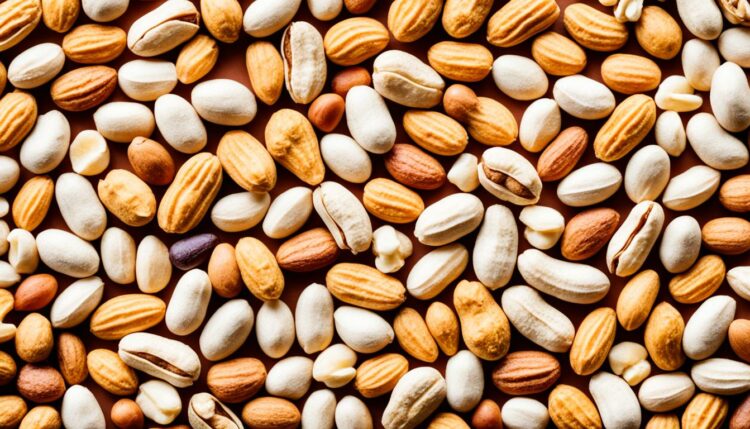Did you know that peanuts are loaded with essential nutrients and provide the body with all 20 amino acids, including the immune-boosting amino acid arginine?
These little legumes are not only delicious but also offer a wide range of health benefits that may surprise you. From promoting heart health to aiding in weight loss, peanuts have become a popular choice for those seeking a nutritious and satisfying snack.
Let’s explore the many ways peanuts can contribute to your overall well-being.
Key Takeaways:
- Peanuts are nutrient-packed legumes that provide all 20 essential amino acids, including arginine.
- Peanuts offer numerous health benefits, including promoting heart health, aiding in weight loss, and preventing gallstones.
- Regular consumption of peanuts can reduce the risk of cancer, treat erectile dysfunction, and improve skin and hair health.
- These versatile legumes also possess antioxidative properties and may help protect against Alzheimer’s disease.
- Adding peanuts to your diet can enhance nutrient intake without causing weight gain.
Promote Heart Health
Eating peanuts has been found to protect against coronary heart disease by lowering bad cholesterol levels and preventing plaque development in the blood vessels. The presence of polyphenols and resveratrol in peanuts offers cardioprotective effects similar to other foods containing resveratrol.
Regular intake of peanuts can also lower triglycerides and increase levels of good cholesterol. However, more research is needed to fully understand the effects of peanuts on heart health.

Aid Weight Loss
Despite being high in calories, peanuts can aid in weight loss. They are energy-dense foods that can promote feelings of fullness and reduce calorie intake later in the day.
Studies have shown that higher nut consumption is not associated with greater body weight gain and can assist with weight control. Adding peanuts to the diet can enhance nutrient intake without causing weight gain.
To understand how peanuts can contribute to weight loss, it’s essential to consider their energy density. While peanuts are calorically dense, their satiating properties help regulate appetite and prevent overeating.
The combination of protein, healthy fats, fiber, and other essential nutrients found in peanuts makes them an ideal choice for those looking to shed pounds.
A study published in the “International Journal of Obesity” found that adults who included peanuts in their diet experienced greater weight loss and improvements in body composition compared to those who did not consume peanuts.
This suggests that peanuts can provide a satisfying snack option while still supporting weight loss goals.
Peanuts are an excellent snack for weight loss due to their high satiety factor and ability to control hunger. They are a nutrient-dense option that can offer health benefits beyond weight management.
Another study conducted by researchers at Purdue University found that individuals who ate peanuts regularly had a reduced risk of obesity and were less likely to gain weight over time. This suggests that incorporating peanuts into a balanced diet can contribute to long-term weight control.
In addition to supporting weight loss, the consumption of peanuts can enhance overall nutrient intake.
Peanuts are a good source of essential vitamins and minerals, such as vitamin E, magnesium, and phosphorus. Including peanuts in your diet can help ensure you’re getting these vital nutrients, which are often lacking in typical Western diets.
Nutrient Content of Peanuts
| Nutrient | Per 1 oz (28g) Serving of Peanuts |
|---|---|
| Calories | 161 |
| Protein | 7g |
| Fat | 14g |
| Fiber | 2.4g |
| Vitamin E | 2.4mg |
| Magnesium | 50mg |
| Phosphorus | 107mg |
Adding peanuts to your weight loss journey can provide a satisfying and nutrient-rich option for snack time. Be mindful of portion sizes, as peanuts are calorie-dense, and it’s important to maintain a balanced calorie deficit for weight loss.
Pairing peanuts with fruits, vegetables, or whole grains can create a well-rounded snack that helps control hunger while providing essential nutrients.

Prevent Gallstones
Eating peanuts regularly has been found to contribute to a lower risk of gallstone disease. Research studies have shown that men who consume five or more units of nuts, including peanuts, per week have a reduced risk of developing gallstones.
Similarly, women who consume five or more units of nuts per week also experience a decreased risk of cholecystectomy, a surgical procedure to remove the gallbladder.
While the exact mechanisms behind this benefit are still being studied, it suggests that incorporating peanuts into your diet may help lower the risk of gallstone-related conditions.
Further investigation is needed to fully understand the relationship between peanuts and the prevention of gallstones. However, based on existing studies, it is encouraging to see the potential positive impact that peanuts can have on reducing the risk of gallstone disease.
Conclusion
Peanuts are not only a delicious snack but also a nutrient-packed powerhouse that offers a wide range of health benefits. Incorporating peanuts into your diet can have significant impacts on your overall well-being.
One of the key benefits of peanuts is their ability to promote heart health. They help lower bad cholesterol levels, prevent plaque build-up in blood vessels, and can increase levels of good cholesterol.
Regular consumption of peanuts has also been associated with a reduced risk of developing gallstones. Studies have shown that individuals who consume peanuts regularly are less likely to require cholecystectomy.
Furthermore, peanuts can aid in weight loss efforts. Despite being calorie-dense, they are also rich in protein and fiber.
This combination helps to increase feelings of fullness, reducing the tendency to consume excessive calories. Incorporating peanuts into a balanced diet can enhance nutrient intake without contributing to weight gain.
In addition to these perks, peanuts contain antioxidants that contribute to overall health. They have the potential to reduce the risk of certain cancers and protect against Alzheimer’s disease. Peanuts also offer other benefits such as improving skin and hair health, treating erectile dysfunction, and boosting energy levels.
In conclusion, peanuts are a nutrient-packed snack that can provide numerous health benefits.
From promoting heart health and aiding in weight loss to preventing gallstones and protecting against cancer, peanuts are an invaluable addition to any diet. Enjoy them in moderation as part of a balanced eating plan to reap the many perks they offer.
FAQ
What are the benefits of peanuts?
Peanuts are packed with essential nutrients and offer various health benefits. They promote heart health, aid in weight loss, prevent gallstones, and help control blood sugar levels. Peanuts also have the potential to reduce the risk of cancer, treat erectile dysfunction, boost energy levels, and improve skin and hair health.
Their antioxidative properties and potential to protect against Alzheimer’s disease make them a valuable addition to the diet.
How do peanuts promote heart health?
Eating peanuts has been found to protect against coronary heart disease by lowering bad cholesterol levels and preventing plaque development in the blood vessels. The presence of polyphenols and resveratrol in peanuts offers cardioprotective effects similar to other foods containing resveratrol.
Regular intake of peanuts can also lower triglycerides and increase levels of good cholesterol. However, more research is needed to fully understand the effects of peanuts on heart health.
Can peanuts aid in weight loss?
Despite being high in calories, peanuts can actually aid in weight loss. They are energy-dense foods that can promote feelings of fullness and reduce calorie intake later in the day.
Studies have shown that higher nut consumption is not associated with greater body weight gain and can assist with weight control. Adding peanuts to the diet can enhance nutrient intake without causing weight gain.
Do peanuts help prevent gallstones?
Consumption of peanuts has been linked to a lower risk of gallstones. Studies have found that men consuming five or more units of nuts, including peanuts, per week have a lower risk of gallstone disease.
Similarly, women consuming five or more units of nuts per week are at a reduced risk of cholecystectomy. However, further research is needed to fully understand this benefit of peanuts.
What are the overall benefits of peanuts?
Peanuts offer a wide array of health benefits, making them a valuable addition to the diet. They can promote heart health, aid in weight loss, prevent gallstones, and help control blood sugar levels.
Peanuts also have the potential to reduce the risk of cancer, treat erectile dysfunction, boost energy levels, and improve skin and hair health. With their antioxidative properties and potential to protect against Alzheimer’s disease, peanuts are a nutrient-packed snack that can contribute to overall health and well-being.




